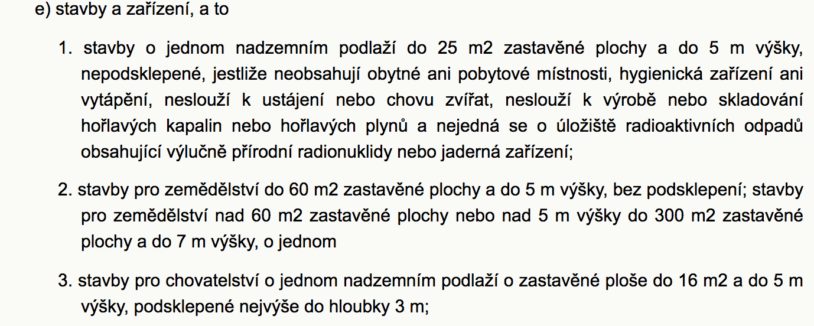Garden for sale to private ownership
If you find yourself buying a garden standing on your own land, it provides you as the owner with several major advantages = security of tenure and no restrictions in the form of by-laws. We often see prospective purchasers buying a garden with the promise that the garden will be converted into a building plot in the future. We have discussed the fact that it is not advisable to rely only on a verbal promise in our article on the sale of land, but we definitely recommend using a contract of sale for the garden.
Many people interested in gardening approach the purchase of a garden with the prospect of a future transfer to a building plot. In these transactions, always remember that a well drafted model garden purchase agreement.
When buying a garden for so-called “personal” ownership, you must of course take into account the higher purchase price and the limited number of such properties. That is why many of those interested in gardening end up resorting to the second option, which is gardens used on a lease or sublease basis.
Buying a garden as your own land has the same process as any other property purchase. We have discussed the process in detail in our article on selling a home. The only thing to remember is the fact that a cottage situated on land may be subject to different legal regimes depending on whether or not it is registered at the Land Registry.
Are you solving a similar problem?
Raise legal protection to the maximum
Whether you are dealing with the transfer of a garden house or signing a contract for the sale of a garden to personal ownership, a solicitor’s check is in order. This is the only way to ensure that the contract does not contain any loopholes that are easy for the layman to miss.
I will use the quick contract check
- When you order, you know what you will get and how much it will cost.
- We handle everything online or in person at one of our 6 offices.
- We handle 8 out of 10 requests within 2 working days.
- We have specialists for every field of law.
“Selling the garden” in garden colonies
Even though you will often see similar advertisements, it is not about buying a garden, but only about renting or subletting it. Gardening colonies are a system where a lease is concluded with the landowner and the members most often use individual gardens on the basis of a sublease agreement.
What to check before signing a garden sublet agreement?
- Find out what land the garden is on and how long the tenancy agreement is for – bear in mind that even if it is an open-ended agreement, it can be terminated, often with a notice period of 1 year. This means that contracts signed for decades are your best bet.
- Check the cottage at the Land Registry – if there is a cottage in your garden, check the Land Registry to see if it is registered. In most cases, the cottages are owned by the users of the gardens. There is then a transfer of ownership of the cottage between the original and new sub-tenant, and then an assignment of the sub-lease between the garden colony and the new sub-tenant.
- Check the internal regulations of the gardening colony – in practice, we encounter that the conclusion of a garden sublease is conditional on membership in a civic association (gardening colony), which may be subject to an entry fee of thousands of crowns. In the internal rules you will also find the fees associated with the use of the garden or the rules for keeping small animals.
Tip for article
Tip: It is important to synchronise the first two steps to avoid being the owner of a cottage without the right to use the garden, or vice versa.
How to proceed if you are “buying” a garden in a gardening colony?
The first step is to conclude a purchase contract for the transfer of ownership of the garden cottage (if it is located on the land). An important point in the contract is the severance clause, which gives you a guarantee that if the sublease of the garden is not obtained by a certain date, the entire purchase contract for the garden will be cancelled .
An available attorney advises, ” The severance clause should also be reflected in the payment of the purchase price, which should occur after the transfer of the sublease.”
In the contract for the purchase of the cottage, we recommend that you set a time limit within which the seller is obliged to vacate the cottage, with the other items becoming the property of the buyer. At the same time, there should be no lack of guarantees from the seller about the construction of the cottage in accordance with the law or the absence of arrears to the garden colony. We also advise our clients to add a confirmation from the seller that he has no information that the gardening colony is to be dissolved.
Tip for article
Tip: Don’t underestimate the garden purchase agreement in the case of a garden cottage, given the lower legal protection for the subtenant.
The next step is for the joint tenants (existing and new) to apply to the Gardening Colony for a transfer of the sublease.
The use of a garden as a sublease always carries certain risks. A well-drafted agreement will help to minimise these.
Building a house, summerhouse or pergola after selling the garden
At this point, the provisions of Section 103(1) of the Building Act, which states that building permits and notifications to the building authority are not required, will be crucial for you :
You will only need planning consent for this type of building. Otherwise, you will find advice on what to prepare for in the article on building a greenfield house.
An available attorney advises, “Complications can arise from local regulations imposed by the municipality’s zoning plan, ordinances, or conservation or preservation zones. A simple solution is to contact the relevant building authority.”
For planning consent you will need:
- an extract from the Land Registry,
- a cadastral situation with a drawing of the plan,
- consent of neighbours with signatures,
- a simplified building design
- and, if the garden is in a garden colony, the consent of the landowner.
What about the registration of the house in the land register?
Even though you can avoid planning permission, you still have to register the property with the Land Registry. For this, slightly different conditions apply. The Land Registry does not register the small buildings under which it falls:
- a building that serves an additional function to the main building, with one storey, a built-up area of up to 16 m2 and a height of up to 4.5 m,
- a building with a built-up area of up to 30 m2 and a height of up to 5 m on land intended to fulfil the function of a forest, used for the provision of forest nurseries or for hunting,
- garages, buildings for fire protection, warehouses and landfills for hazardous waste, warehouses for combustibles and explosives.
If your building does not fall under any of the points, you will need to submit a petition for registration of the property in the Land Registry.
Interesting fact about watering your garden with water from the river
Once the barrels have dried up and there is a river or stream near your garden, the logical idea is to collect water for watering from a natural source. However, you will not avoid a conflict with the law here either.
If you use a bucket or a watering can, that’s fine. You are acting in accordance with the Water Act, which states that “anyone may, at his own risk and without the permission or consent of the authority, abstract surface water for his own use, provided that he does not use special technical equipment for this purpose.”
In case you want to take water from the river using a pump, you will need a permit from the water authority. This will tell you for what purpose you want to draw the water, how much and for how long. If you get the permit, you can pump 6 000 m3 of water per year or 500 m3 per month without paying a fee. If you do not get a permit, you can be fined up to CZK 50 000. For entrepreneurs and companies, the amount is up to CZK 100,000.
An exception, especially in the summer months, is when municipalities declare a ban on pumping surface and groundwater.
Experts on the sale of gardens and real estate in general
At Affordable Lawyer we have legal experts who have long specialised in property sales. We can provide a full contractual and legal service relating to the purchase or sale of a garden. We can do it within 48 hours, flawlessly and professionally.
Summary
Selling a garden can involve several specifics depending on the type of ownership. For gardens on their own land, the buyer gains security of tenure but must expect a higher purchase price. Gardens in garden colonies are usually used under lease or sub-lease agreements, and it is necessary to verify the length of the lease, the ownership of the cottage in the Land Registry and to comply with the rules of the colony’s internal regulations. Buildings in the garden, such as cottages or pergolas, often do not require building permits but may be subject to local regulations.






